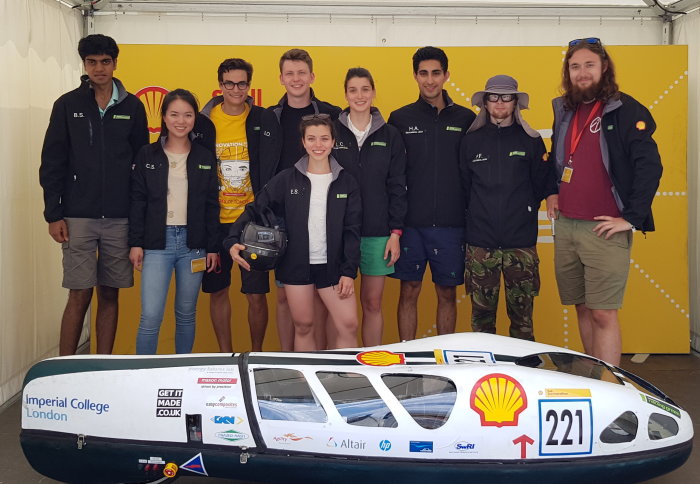Green racing and inspirational AI: News from the College

Here’s a batch of fresh news and announcements from across Imperial.
From a showcase for Imperial’s latest zero-emission racecar, to new insights into how AI can inspire doctors, here is some quick-read news from across the College.
Green racing
This weekend a flagship interdisciplinary teaching project, Imperial Racing Green, will exhibit a zero-emission racecar at the Lord Mayor’s show.
Oisin Shaw, PhD student in the Department of Mechanical Engineering and postgraduate advisor to the team, said: “Imperial Racing Green works to teach students passionate about motorsport, while also developing skills and ideation regarding renewable and electric vehicles.

Many of the students involved go on to work in professional motorsport, or research in the renewable energy sector. Part of this mission includes communicating the technology and development process to the public, as the teams rely on sponsorship.”
The interdisciplinary team enters this hydrogen fuel cell car into the Shell Eco-Marathon, a globally renowned competition challenging students around the world to design, build and drive their own ultra-energy-efficient vehicles.
Hay fever markers in the blood
 Imperial researchers are sniffing out new biomarkers in the blood to show if hay fever therapies are working.
Imperial researchers are sniffing out new biomarkers in the blood to show if hay fever therapies are working.
Hay fever is caused by the immune system over-reacting to proteins from plant pollen. In most cases, symptoms can be treated with over the counter antihistamines, but for some patients immunotherapy based on proteins from grass pollen is needed.
Mohamed Shamji and Janice Layhadi from the NHLI have found that one chemical marker in the body, a cytokine called IL-35, could be used to show if these treatments are having a lasting effect.
They now hope to test for the marker in more patients undergoing treatment.
Read the full paper: Role of IL-35 in sublingual allergen immunotherapy
MBA Connect
 MBA students from Imperial College Business School are to share their unique business insights with student entrepreneurs with the launch of the 2019 MBA Connect programme.
MBA students from Imperial College Business School are to share their unique business insights with student entrepreneurs with the launch of the 2019 MBA Connect programme.
MBA Connect, which is supported by the Imperial Enterprise Lab, is a student-led mentoring programme which aims to create a bridge between Imperial College Business School and the wider innovation community at Imperial.
The eight week program matches enterprising students with experienced MBA students who provide them with unique industry insights and business coaching to help their startups grow and succeed.
Mentees can receive advice on career advancement, business strategy and planning, marketing and communications, sales, and pitch preparation.
Register your interest in the programme.
Space winds reproduced in the lab
The stream of high-speed charged particles from the Sun – the solar wind -- can interact with Earth’s magnetic field and cause ‘space weather’, which is a major hazard to spacecraft, satellites and electrical grids. At the MAGPIE laboratory at Imperial, experiments replicate the solar wind with plumes of charged particles moving faster than the speed of sound.
 The particles are directed onto targets that have magnetic fields, which simulates the interaction of the solar wind with planets such as Earth, Jupiter or Saturn. Most recently, researchers at MAGPIE have been able to reproduce some of the important features of this collision in the laboratory.
The particles are directed onto targets that have magnetic fields, which simulates the interaction of the solar wind with planets such as Earth, Jupiter or Saturn. Most recently, researchers at MAGPIE have been able to reproduce some of the important features of this collision in the laboratory.
The team presented their work this week at the American Physical Society Division of Plasma Physics meeting.
Inspirational AI
 Artificial intelligence and machine learning can inspire doctors towards new ways of maintaining health and stabilizing disease. This is the message of a World Economic Forum’s Agenda blog article penned by Nicholas Peters, Professor of Cardiology and Head of Cardiac Electrophysiology at the National Heart & Lung Institute.
Artificial intelligence and machine learning can inspire doctors towards new ways of maintaining health and stabilizing disease. This is the message of a World Economic Forum’s Agenda blog article penned by Nicholas Peters, Professor of Cardiology and Head of Cardiac Electrophysiology at the National Heart & Lung Institute.

Professor Peters writes: “Healthcare has become less based on clinical acumen and judgement, and more based on tests and investigations to produce data for protocoled management decisions…Paradoxically, the solution may lie in even more data, algorithms and protocols, but with these processes taken out of the hands of the healthcare worker and fully automated using smart technologies.”
Read the full article: How AI can inspire doctors to be more inventive
–
Want to be kept up to date on news at Imperial?
Sign up for our free quick-read daily e-newsletter, Imperial Today.

Article text (excluding photos or graphics) © Imperial College London.
Photos and graphics subject to third party copyright used with permission or © Imperial College London.
Reporter
Stephen Johns
Communications Division
Joanna Wilson
Communications Division
Andrew Youngson
Communications Division
Hayley Dunning
Communications Division